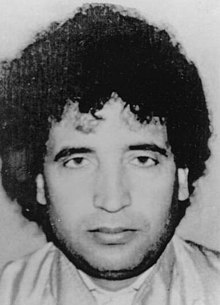| Abdelbaset al-Megrahi | |
|---|---|
 al-Megrahi in 1988 | |
| FBI Ten Most Wanted Fugitive | |
| Charges |
|
| Alias | Ahmed Khalifa Abdusamad |
| Description | |
| Born | 1 April 1952 Tripoli, United Kingdom of Libya |
| Died | 20 May 2012 (aged 60) Tripoli, Libya |
| Cause of death | Prostate cancer |
| Nationality | Libyan |
| Gender | Male |
| Height | 1.73 m (5 ft 8 in) |
| Occupation |
|
| Siblings | Zeinab (eldest sister) and others |
| Spouse |
Aisha (m. 1982) |
| Children | 4 sons, 1 daughter |
| Status | |
| Convictions | Murder (270 counts) |
| Penalty | Life imprisonment with possibility of parole after 27 years |
| Status | Died following compassionate release |
| Added | 23 March 1995 |
| Caught | 5 April 1999 |
| Number | 441 |
| Captured | |
Abdelbaset Ali Mohamed al-Megrahi ( Arabic: عبد الباسط محمد علي المقرحي, ʿAbdu l-Bāsiṭ Muḥammad ʿAlī al-Maqraḥī; 1 April 1952 – 20 May 2012) was a Libyan who was head of security for Libyan Arab Airlines, director of the Centre for Strategic Studies in Tripoli, Libya, and an alleged Libyan intelligence officer.[1] On 31 January 2001, Megrahi was convicted, by a panel of three Scottish judges sitting in a special court at Camp Zeist in the Netherlands, of 270 counts of murder for the bombing of Pan Am Flight 103 over Lockerbie, Scotland, on 21 December 1988 and was sentenced to life imprisonment. His co-accused, Lamin Khalifah Fhimah, was found not guilty and was acquitted.[2]
Megrahi unsuccessfully appealed his 2001 conviction. In June 2007, the Scottish Criminal Cases Review Commission granted Megrahi leave to appeal his Lockerbie bombing conviction for a second time. Megrahi abandoned his second appeal in August 2009 as an ongoing appeal would have prevented him from being moved to Libya under the Prisoner Transfer Scheme which was thought to be a possibility. He decided to drop his appeal two days[3] before he was released on compassionate grounds by the Scottish Government on 20 August 2009. Doctors had reported on 10 August 2009 that he had terminal prostate cancer.[4][5] On his return to Libya, al-Megrahi was hospitalized, then allowed to leave on 2 November 2009, taking up residence in a villa in Tripoli.[6] He died on 20 May 2012, two years and nine months after his release.[7]
- ^ Jason Allardyce (20 September 2009). "Legal doubt over Megrahi's guilt". Sunday Times. UK. Retrieved 21 September 2009.[dead link]
- ^ "Pan Am 103 – Lockerbie verdict". Terrorismcentral.com. Archived from the original on 18 September 2009. Retrieved 5 June 2010.
- ^ "Lockerbie bomber Abdelbaset al-Megrahi dies in Tripoli". BBC News. 20 May 2012.
- ^ "Progress record" (PDF). The Times. UK. Archived from the original (PDF) on 21 February 2011. Retrieved 27 January 2010.
The clinical assessment, therefore, is that a 3 month prognosis is now a reasonable estimate for this patient.
- ^ Tom Gordon (31 October 2010). "Government admits Megrahi always had 50/50 chance of living past three months". Herald Scotland. Retrieved 16 May 2011.
- ^ Alderson, Andrew (20 February 2010). "Lockerbie bomber Megrahi living in luxury villa six months after being at 'death's door'". The Telegraph. London. Retrieved 30 July 2010.
- ^ "Lockerbie bomber Abdelbaset al-Megrahi dies in Tripoli". BBC. 20 May 2012. Retrieved 20 May 2012.